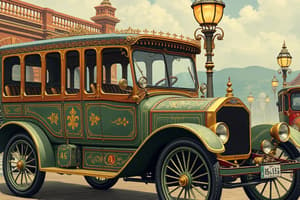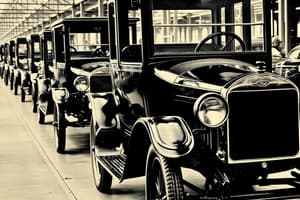Podcast
Questions and Answers
Who is often credited as the inventor of the modern car?
Who is often credited as the inventor of the modern car?
- Henry Ford
- Nikolaus Otto
- Karl Benz (correct)
- Étienne Lenoir
Which inventor introduced assembly lines in 1913 to produce Model T Fords efficiently?
Which inventor introduced assembly lines in 1913 to produce Model T Fords efficiently?
- Nikolaus Otto
- Henry Ford (correct)
- Karl Benz
- Étienne Lenoir
During which era did sleeker designs and powerful engines follow in automobile history?
During which era did sleeker designs and powerful engines follow in automobile history?
- Renaissance era
- Victorian era
- Industrial Revolution era
- Art Deco era (correct)
Which country ushered in the golden age of automobiles after World War II?
Which country ushered in the golden age of automobiles after World War II?
Which event led to mass production and widespread distribution of vehicles by the turn of the century?
Which event led to mass production and widespread distribution of vehicles by the turn of the century?
What major innovations in automotive history have significantly reduced road accidents and fatalities?
What major innovations in automotive history have significantly reduced road accidents and fatalities?
What advancements promise safer roads while reducing human error behind the wheel?
What advancements promise safer roads while reducing human error behind the wheel?
Which of the following innovations contribute to making motoring increasingly convenient and efficient?
Which of the following innovations contribute to making motoring increasingly convenient and efficient?
What has been a significant impact of turbochargers and direct injection in modern cars?
What has been a significant impact of turbochargers and direct injection in modern cars?
Which country leads in global auto sales according to the text?
Which country leads in global auto sales according to the text?
Flashcards are hidden until you start studying
Study Notes
Exploring Automobiles: A Journey through Auto History
Automobiles have revolutionized our world, shaping how we move, live, and interact. From their humble beginnings nearly two centuries ago to today's cutting-edge technologies, cars continue to evolve with each passing year. Let's delve into this fascinating realm of four wheels and horsepower.
Origins
Karl Benz is often credited as the inventor of the modern car when he unveiled his gasoline-powered three-wheeler vehicle in Mannheim, Germany on January 29th, 1886. However, there were others working independently around the globe who contributed to automobile development beforehand—such as Nikolaus Otto from Germany and Étienne Lenoir from France. By the turn of the century, numerous manufacturers were producing vehicles powered by internal combustion engines, leading to mass production and widespread distribution.
Evolution
Auto history has been riddled with significant milestones. Henry Ford introduced assembly lines in 1913 to produce Model T Fords more efficiently, making automobiles affordable for average citizens. Sleeker designs and powerful engines followed during the Art Deco era of the '20s and early '30s. After World War II, America ushered in the golden age of automobiles, marked by the rise of iconic brands like Chevrolet, Chrysler, and General Motors.
The growing environmental concerns over pollution and fuel consumption led to developments such as electric cars in the late 1990s and hybrids in the mid-2000s. Advancements in autonomous driving technology began gaining traction toward the end of the last decade, promising safer roads while reducing human error behind the wheel.
Impactful Innovations
Some groundbreaking innovations throughout auto history deserve special mention. For example, safety features like seat belts, airbags, anti-lock brakes, and rearview cameras have drastically reduced road accidents and fatalities. Alternatively, technological advancements such as satellite navigation systems, smartphone connectivity, and regenerative breaking have made motoring increasingly convenient and efficient.
Modern cars also feature computer-controlled transmissions, continuously variable transmissions, and dual-clutch gearboxes, providing smooth power delivery without manual shifting. Additionally, turbochargers and direct injection help optimize engine performance while maintaining energy efficiency.
Global Presence
Today, automotive manufacturing spans five continents, employing approximately 10 million people worldwide and generating annual revenues exceeding $2 trillion USD. Several countries dominate global auto sales—China leads the pack, followed by the United States, Japan, Germany, and South Korea.
As you can see, automobiles indelibly imprint themselves upon our daily lives, offering convenience, innovation, and global interconnectedness. Whether it's discovering pioneering figures, appreciating intriguing eras, examining revolutionary developments, or acknowledging its far-reaching influence, understanding the evolution of autos leaves one captivated and inspired.
Studying That Suits You
Use AI to generate personalized quizzes and flashcards to suit your learning preferences.




